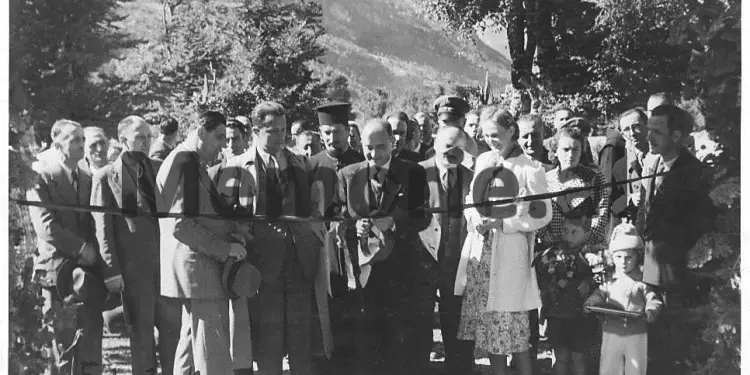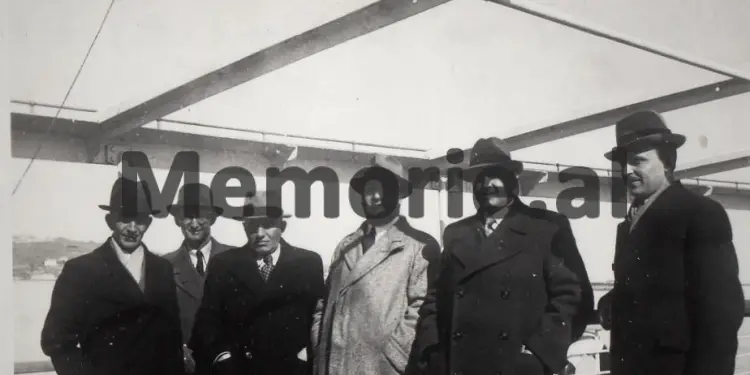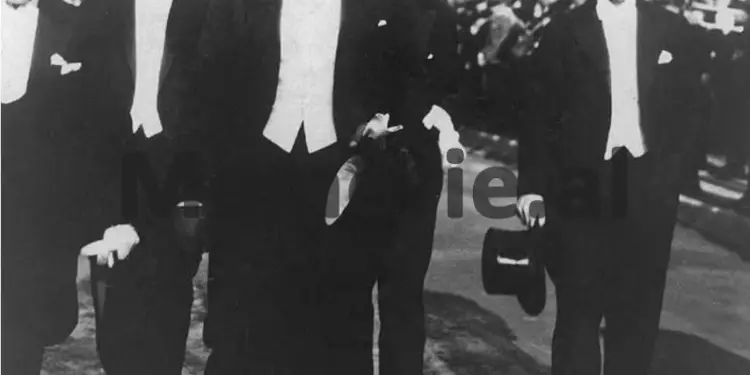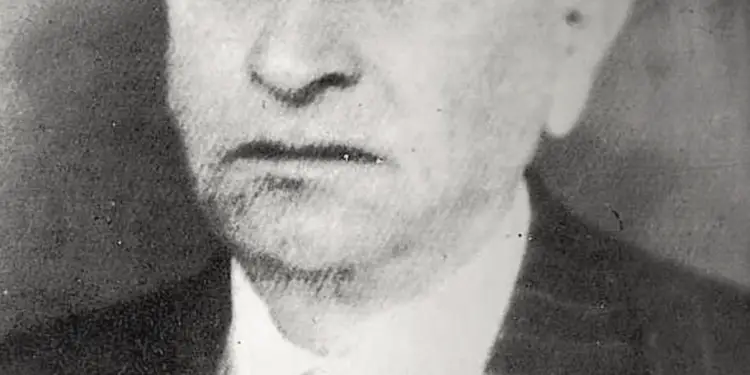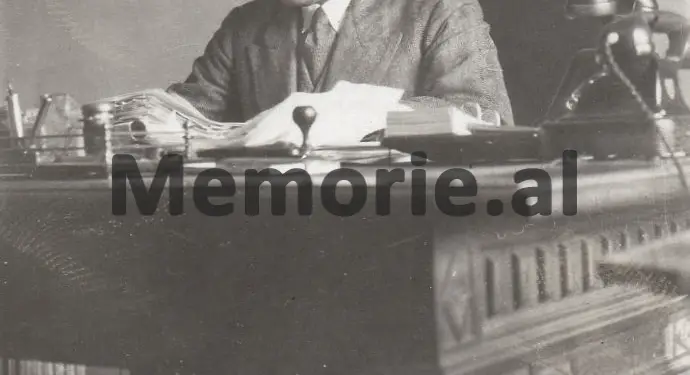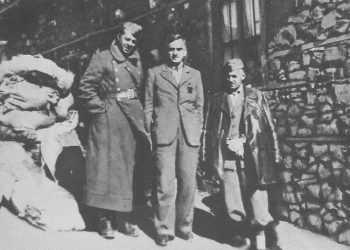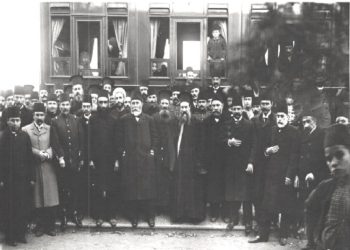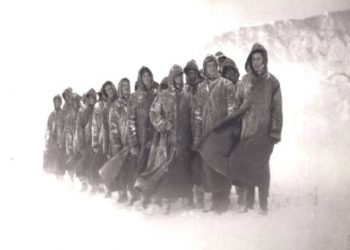By Arben Pustina
-Rrok Gera, a proper statesman –
FORWARD
Memorie.al/ This book aims to convey to the public the image of a perfect man, who lived in other times, but who was the best example, not only of what an ordinary man can represent, but, next first, as an example of a noble, distinguished, omniscient and, above all, honest statesman. Having in his genes the noble virtues of his origin, being formed as a personality in a wonderful environment, such as Shkodra at the beginning of the 20th century, and graduating from one of the most prestigious universities in Europe, such as that of In Vienna, Rrok Gera had all the potential to be one of the important figures who gave rise to a rapid development through comprehensive reforms in Albania in the 30s of the last century.
This development reached its peak with the government of Mehdi Frashër, considered perhaps the best Albanian government of all time, formed for the most part by non-political persons, among who was Rrok Gera. For 10 years, or more, as a minister or in other high state functions, he worked with conviction that he was walking on the right path for the consolidation of the Albanian state, a process for which he said he had no time to lose. Economist, financier, diplomat, lawyer, Gera was a specialist who advanced towards the top with his professionalism in an environment where the old factions, which were almost dominant in politics and governance, lost ground in front of young and educated people good.
Continues from last issue
RROK GERA IN THE PERIOD OF THE OCCUPATION OF THE COUNTRY, 1939-1944
It’s enough to read these lines to understand what concerns the Italian leaders of the BKSh had at those moments, while below it will also be clearly seen their determination to use any means to preserve their own interest. In the first months of 1944, an initial project for the nationalization of the National Bank of Albania was presented. A little later, in the spring, another project was drawn up on this issue. As it appears from many different documents and publications, including the diary of the Central Directorate of the Central Directorate of the Central Bank, Rrok Gera had a leading role in the efforts to implement this project.
On Sunday, May 7, 1944, Dr. Pasko confidentially informed Dr. Meliss, for an intensive preparatory work that was being undertaken in the Council of Ministers, regarding a task that would be entrusted to the former Minister of Finance and National Economy, Rrok Gera, to go to Rome, as a plenipotentiary, with the aim the reaching of an agreement that had to do with the desirable participation of the Albanian state in the shares of BKSh.
According to the Diary of the Bank’s Central Directorate, on Monday, May 8, Gera held a meeting with director Ettore Meliss, where the issue in question was discussed. Following the decision of April 28, 1944 of the Council of Ministers, on May 10, 1944, Rrok Gera was given a mandate, through which he was appointed a full-fledged minister of the first class, with the right to decide in the negotiations with the Italians, regarding with the passing of the majority of shares in favor of the Albanian state. As can be seen in the following document, even on the eve of leaving for Italy, Gera did not have any state function, but went to that mission, just like many other times, with the good desire to contribute to the country.
Special mandate, “I sign Musa Gjylbegaj, Deputy Minister of Finance, Minister of World Affairs of Albania, on the basis of Decision No. 310, dated April 28, 1944, of the Council of Ministers of Albania, by means of this document in the name and on behalf of the Albanian Government, Mr. Dr. Rrok Gera, former Minister of Finance and National Economy, Plenipotentiary Minister of Kl. First, full powers to replace me, with treaties, with conclusions and signatures with full validity for me, in the name and on behalf of the Albanian Government, with any natural and legal person, any act and contract that has end with the transfer of the majority of the shares of the National Bank of Albania to the possession of the Albanian State.
On the basis of this delegation and for this purpose, it can specifically: 1)- By treaty, concluded and signed with the Rome Headquarters of the National Bank of Albania or with the Italian Financial Group, which is referred to in The Convention dated March 15, 1925, or with the Representative and Representatives of this Group, any act or convention for any issue that has to do directly or indirectly with the Bank in question, with its shares or with its condition; 2)- Also by concluding and signing for the purpose of this mandate, any Convention or Contract with any natural person or moral entity, private or public (citizen, non-citizen, etc.), who has relations, rights and interests, entitled to directly and indirectly, for its own account or for others, with the National Bank of Albania, with its shares or with the active and passive balance of its balance sheet; 3)- I buy, pay and take delivery, for the account of the Albanian State, the shares of the National Bank of Albania, whether these are ordinary, or the founder, nominal or Rrok Gera the maker.
Finally, all the acts and conventions that Mr. Rrok Gera has concluded and signed in virtue of and within the limits of this mandate, they are called to be made and signed in my country, in the name and on behalf of the Albanian Government and are valid for all effects and against anyone. This act was drawn up in four originals. One of them, together with the authentic translation in Italian, will be transmitted to the National Bank of Albania; Headquarters in Rome, through its Head Office in Tirana, a second copy will be presented to the Headquarters in Rome. The National Bank personally by Mr. Rrok Gera, the third copy will be held by Mr. Rrok Gera, in order to prove his full powers to anyone, the last specimen remains with the Ministry of Finance of Albania. Bamun in Tirana on May 10, 1944 Authentic signature of ZAV. MINISTER OF FINANCE Mr. Rrok Gera MUSA GJYLBEGAJ”.
Meanwhile, on Friday, May 12, 1944, Minister Gjylbegaj asked the Central Directorate of the Central Bank of Serbia to draft a cover letter for the Shareholders’ Committee in Rome. While he had gone to the offices of this Directorate, for the letter, which he would present at the meetings he would hold in Italy, Gera had emphasized that, in this mission, he was in the role of an ambassador, and had undertaken this initiative by represented the will of the Albanian government. The next day, Saturday May 13, Rrok Gera left very early in the morning for Belgrade, from where he would arrive in Venice.
After arriving in this Italian city, he first contacted personalities close to the Ministry of Foreign Affairs, such as Ambassador Capasso Torre, General Gabrielli, and Lorusso Attoman, to whom he spoke about the purpose of his mission. According to the diaries of the Central Directorate of the Bank, Gera had claimed that the personalities in question had found acceptable the demands of the Albanian government regarding the acquisition of the majority of the shares of BKSh, and even Capasso Torre had invited him, that in this direction, to submit a memorandum to the Duce, so that the matter could be resolved.
But Gera’s meeting with the representative of the Italian financial group of the National Security Agency, Amedeo Gambino, did not take place, as the military operations had come too close to Rome, so a telephone conversation took place between the two personalities on the evening of May 31. Still according to the diaries of the Bank’s Central Directorate, which quote Rrok Gera, Gambino had admitted that he was not personally against the request of the Albanian government to have the majority of the shares of BKSh, but insisted that Gera go to Rome to negotiate directly with the majority of the Bank’s shareholders residing in the capital.
Asked by Rrok Gera how long this discussion with the majority of shareholders could last, Gambino had emphasized that the issue could not be resolved in a few days, while being asked if an intervention of the Italian government was necessary in order to reach such an agreement, Gambino had stated that this intervention would be necessary. However, after some hesitation, Gera thought he should go to Rome, but in those days, the war situation in the area became even more severe, making it impossible for him to travel.252 After the conversation with Gambino, Rrok Gera had given him a telegram to the government in Tirana, asking for further instructions on the created situation, but had not received any response.
In these conditions, after a few days, he traveled to Vienna. As can be clearly understood, starting from the time extension of the mission, the Italian side was not interested in reaching an agreement on the BKSh, so it wanted to drag out the talks endlessly. Even further, during the summer of 1944, the Italian directors of the Bank continued to be very concerned about their interests that could be affected by the expropriation of some of the shares they had in this Bank. Working in many directions, they set in motion (as Iljaz Fishta writes in his book “The Monetary and Credit System in Albania 1925-1944”), their people, who exerted pressure to prevent the approval of the nationalization project Bank.
From the middle of June 1944, Dr. Pasko confidentially informed the Central Directorate of the Bank that the Council of Ministers was thinking about the preparation of the draft law for the establishment of a new Administrative Council of the Bank, at the head of which would be Rrok Gera, who at that time was still abroad. Yes, according to Paskos, Regent Mehdi Frashëri wanted his son, Ragip, to be in the Administrative Council, and, in addition to the President of the Council, who would be Gera, Vangjel Meksi, Thoma Orollogaj, Zija Bejleri, Xelal Mitrovica would also be part of it as well as another person.
In a meeting held on June 23, 1944, between the Minister of Finance Dodbiba, Ettore Meliss, Bressan and Paskos, the draft law was the main topic of discussion, but following this, Minister Dodbiba preferred that the review of the decree be done by Gera himself, since he was expected to be in the capacity of the President of this Council. Meanwhile, in the summer of 1944, the gradual weakening of the government of Rexhep Mitrovica and the institutional crisis between the Government, the Supreme Council and the Parliament had caused the discussions for a new government, started in the spring of that year, to end with the formation of a new cabinet, headed by Fiqiri Dine, who accepted the office of prime minister in a mission that was most appreciated for the unifying theory of nationalist forces in Albania.
Rrok Gera was part of the Dines government, announced on July 17, 1944. Against his will (he had opposed proposals in this direction several times), he finally accepted the task, because, among other things, he wanted to implement the project for the nationalization of the shares of the National Bank of Ukraine. In favor of this argument is the fact that, on July 15, Dhimitër Pasko wrote a letter to Gera, through which he suggested his thoughts regarding what he called the “Albanianization” of the National Bank.
During the testimony given in the Special Court of 1945, Gera stated that “…Regarding the ministerial appointment, he was in Shkodër, when on 13.7.1944; he received a telegram to appear in Tirana. Mehdi Frashëri told him that he had appointed him minister and it was not good for him not to accept the position due to issues of compromise”. But things become even clearer in a letter from Gera, written on August 9, 1944, to Regent Mehdi Frashëri, where he reminded the latter that he had actually appointed him to the post of Minister of Finance, as he had initially been against and then he didn’t even have time to answer, whether he agreed or not:
“…On July 15, 1944, Your Excellency, you were kind enough to inform me that Aji of Nalti Council had entrusted me with the Department of Finance in the Government of Shk. T. Fiqri Dine. In that case, I presented some personal reasons that made it impossible for me to accept such a burden, but Your Excellency insisted that you take into account the high interest of the Nation, so I did not have the courage to insist on personal reasons any longer. You should know that we have been away from state duties since April 7, 1939, so you should not have, therefore, the deep announcements about the situation created in our State during the time of the Italian occupation and later under the resigning Government, a situation that a The Minister of Finance should know in advance if he can or not, he will be able to carry out such a task.
I begged you Shk. I asked him to give me a deadline for a study of the smallest figures and circumstances, so that I could answer with a “yes” or a “no”. Dec. You were kind enough to issue the Government Decrees on July 17, 1944 (that is, when I had not formed any opinion on the country’s financial situation and possibilities), and I learned this fact when, on July 19, I was invited to appear for oath before Asaja of Nalta Regency. It was not long before he submitted a protest on such a solemn occasion, and I thought that maybe with good will and hard work, he could come out on top.”
In addition to Prime Minister Dine, who also held the position of Minister of Internal Affairs, and Gera, who held the position of Minister of Finance, this government also included: Eqerem Vlora, Minister of Foreign Affairs and Justice, Rifat Begolli, Minister of National Economy, Musa Gjylbegu, Minister of World Affairs, Koço Muka, Minister of Education and Mark Gjon Markaj, Minister of Culture. According to the press of the time, at 18:00 on July 24, 1944, a meeting of the Albanian Parliament was held to vote for the new government.
That afternoon, in the full hall of the Parliament, the highest dignitaries of the country were present, all the deputies, members of the High Council, of the Government, the Commander of the National Defense, generals of the German army in Albania, the minister of Germany and the entire diplomatic body accredited in Tirana, representatives of three religious faiths, representatives of the press as well as a large number of listeners. At 18:00, the Speaker of the Parliament, Mihal Zallari, entered the hall, followed by the Prime Minister Fiqiri Dine. The speaker of the Parliament gave the floor to the new prime minister, who presented the program of the newly formed government, the axis of which was the national ideal:
“…The national ideal above everything. Above everything, Mr. Deputy, stands the national ideal, the Albanian nation, Albanian ethnic identity, Albanian brotherhood in the name of the Motherland, public order and progress. It is the duty of each of us and all of us together to methodically adapt our actions to this common ideal, if we want to avoid any disagreement that endangers our present state and that of a more beautiful, more prosperous tomorrow excellent that we have the duty and the right to foresee it”.
Furthermore, Dine emphasized that the then Albanian state, according to the will of the entire people, was a neutral state and the presence of German troops in Albania since the capitulation of Italy on September 8, 1943, had a temporary character, determined by the conditions of the war . For this neutrality of Albania at that time, the prime minister saw it as the government’s duty to clarify the international opinion that: “…it will be the government’s care to avoid any misunderstanding and any complications in this direction. The government did its best to enlighten and appeal to the external opinion on the above, thus saving our country a greater desolation and collapse than what we have seen until today.
The new government, which was voted unanimously by the Parliament, was well received by the local public. In the newspaper “Bashkimi i Kombit”, dated July 30, 1944, regarding the government’s program, announced before the Parliament, Nebil Çika commented: “it is more than a program, it is a political spirit that we must have all, … is a call to all those who have a patriotic conscience, enlightened and purified, it is the voice of those who originate from the general opinion, which itself has its root in the desire of the nation, in the deep tendencies of the national soul…”.
But the Germans were not at all satisfied with the composition of the new Albanian government, they were even angry 259 Newspaper “Bashkimi i Kombit”, July 25, 1944. Government of F. Dines, July 1944. Rr. Gera, second from left to right. 190 Rok Gera hard. The German commander-in-chief in Albania, Fictum, did not trust a government with the elements that were chosen in its composition, as he considered that Prime Minister Dine was close to Abaz Kupin, who had frequent contacts with the British. Memorie.al
The next issue follows








